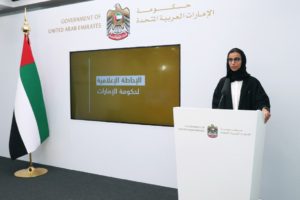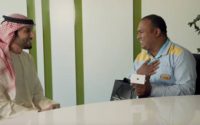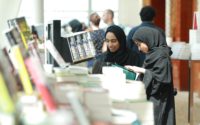COVID-19 Recoveries Rise To 2,664, 561 New Cases Detected: UAE Government
The UAE Government announced on Saturday that 121 new patients fully recovered from COVID-19 after receiving the necessary medical care, bringing the total number of recoveries in the country to 2,664.
The announcement was made during the regular media briefing held in Abu Dhabi, wherein Dr. Amna Al Dahak Al Shamsi, the official spokesperson for the UAE Government, Fatima Alkaabi, Head Hematology& Oncology at Sheikh Khalifa Medical City, and Dr. Alawi Al Sheikh, the spokesman for the advanced science sector, gave an update on the coronavirus-related developments and measures taken to mitigate its impact.
Al Shamsi said that over 36,266 additional COVID-19 tests have been conducted among UAE citizens and residents over the past few days in line with the Ministry of Health and Prevention’s plans to intensify virus screening in order to contain the spread of COVID-19.
“The accelerated investigative measures resulted in the detection of 561 new coronavirus cases among various nationalities, all of whom are in a stable condition and receiving the necessary care, taking to 13,599 the total number of infections in the country,” she added.
“Thanks to the efforts of all those working at the country’s healthcare sector, thousands of tests are being conducted on a daily basis,” she said, noting that the past two weeks saw an average of 29,000 screenings daily.
Al Shamsi announced the death of eight patients from COVID-19, taking the total number of deaths to 119, expressing her sincere condolences to the families of the deceased and wished a speedy recovery to all patients.
In the meantime, Dr Al Shamsi underlined the UAE government’s keenness to prioritise the people of determination while providing various health, and social services.
“Under the directives of His Highness Sheikh Mohamed bin Zayed Al Nahyan, Crown Prince of Abu Dhabi and Deputy Supreme Commander of the UAE Armed Forces, a home testing programme for the people of determination has been launched recently,” she noted, explaining that the programme targets various ages, including Emiratis and residents, who find difficulties in reaching out to screening centres nationwide.
“The programme, which started two weeks ago, results in the detection of 22 COVID-19 cases among people of determination,” she added, calling on the parents and families of the people of determination to “benefit from the services provided through the pioneering programme.”
The families of the people of determination can easily request the programme teams to come to their houses through the following number 02-5968689 from 9.00 a.m. through 4 p.m., Al Shamsi explained.
For her part, Alkaabi, who is also an assistant researcher at the stem cells programme, elaborated on the potential stem cell therapy, announced by the UAE yesterday.
“In response to the directives of the UAE leadership to dedicate all possible human and technological resources to the efforts being made nationwide to confront the COVID-19 crisis, the Abu Dhabi Stem Cell Center conducted medical experiments on cell therapy, regenerative medicine and cutting-edge research on stem cells with encouraging results.
“We, at ADSCC, are proud of developing a supportive treatment for COVID-19. The new therapy, which is the first of its kind in the UAE’s history, is still under clinical trials. Therefore, it is important to drive home the fact that the new potential therapy is a supportive treatment that rather helps Coronavirus patients overcome the symptoms of the virus. However, it does not kill the virus on its own. A total of 28 researchers and specialists have collaboratively worked on developing this breakthrough treatment which is a source of inspiration and pride for all of us,” she explained.
“Stems cells have been used for more than 30 years as a supportive therapy for several illnesses, including leukemia, and immunodeficiency disorders,” she said.
Elaborating on the new supportive treatment, Alkaabi said: “We have isolated a type of primitive stem cells, called embryonic stem cell, which researchers think carry regenerative potential. They belong to that type of cells that are capable of regenerating damaged cells to reduce lung inflammation resulting from COVID-19, and thereby can help these cells to self-regenerate.
“The advantage provided by these cells is that they don’t require surgical intervention as is the case with other types of stem cells. They require a blood sample to be taken from the patient with the therapy to be inhaled into the lungs without surgical intervention. After a blood sample has been taken, the cells therein are subjected to a biological chemical process where the platelets responsible for growth are used to activate these cells so that we can get them inhaled back into the lungs.”
She added that a total of 73 patients, in the mild to critical bracket, have undergone the stem cell treatment trials so far, 25 percent of whom had been under intensive care. “We did the first trial on April 4th and we are now close to completing the compilation of all needed data to perform more comparative trials.
“The more patients we can try the treatment on, the faster we will decide how efficient the treatment is. We will compare the conditions of the patients who’ve received the supportive treatment with those who have not received. Health and safety are always placed on top of our priorities. The next step will be toward applying the treatment on a larger scale,” she added.
Dr Alawi Al Sheikh responded to queries on why some people are more susceptible to the infection than others, saying: “The human body have receptors that act like gates allowing certain material to enter human body. At the respiratory system, these receptors are called ACE2 which allow the virus to enter. The virus that causes Covid-19 can latch onto the ACE2 receptor undetected. The adaptive immune system – the part that creates antibodies that help identify pathogens quickly- hasn’t had a chance to learn what SARS-CoV-2 looks like yet.”
This means the virus can use a molecular phishing scam to sneak into the cell. The immunity system then doubles efforts to fight the virus, which in turn increases the infection symptoms and prolong the disease period. A team of researchers from the Research Institute of Medical & Health Sciences (RIMHS) at the University of Sharjah in collaboration with the medical team at the Mohammed Bin Rashid University Of Medicine and Health Sciences, are studying this issue.
“The study is focused on why COVID-19 spreads less among children comparatively with the elderly people and those suffering from chronic diseases. The study concluded that the children’s lung and nose cells have less receptors than those in the body of the elderly and that the limited number of these cells limit the spread of the disease among the minors who only exhibit mild symptoms if they happen to be infected,” he elaborated.
The number of these receptors increase among smokers and those with respiratory diseases, the study found out.
“Another study by researchers from the Mohammed Bin Rashid University Of Medicine and Health Sciences and Al Jalila Children’s Speciality Hospital along with Sharjah University have found out that these cells are larger in number among those suffering obesity,” he added.
Khalifa University along with relevant authorities are working on a project to detect the existence of the virus in the sanitary water.
“The scheme is aimed at detecting the virus in an early stage in a way that supports the efforts made by R&D departments to assess the percentage and direction of the virus spread in the country,” he explained.






